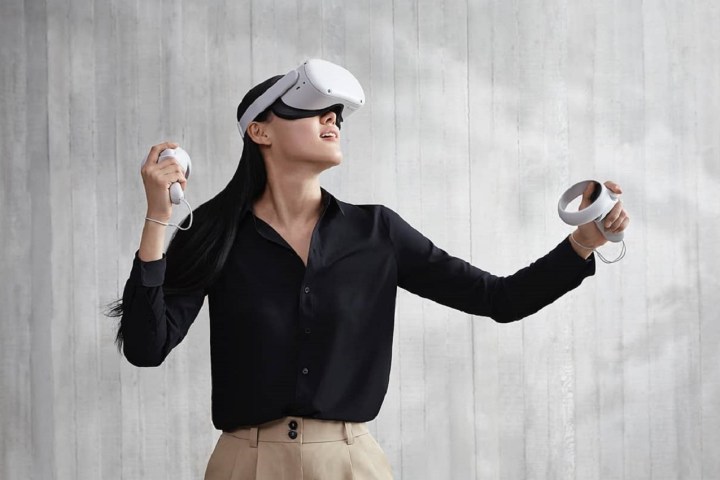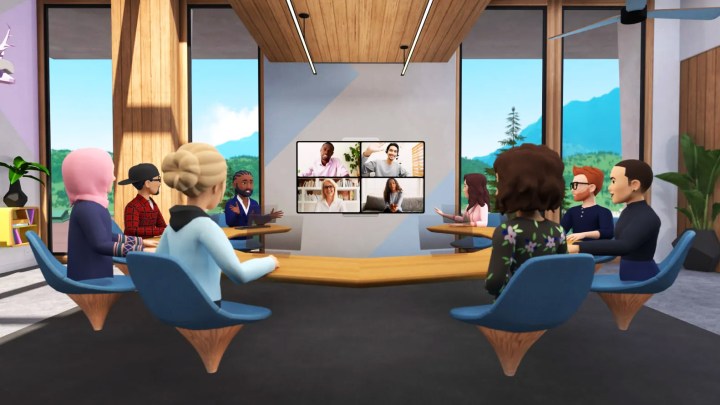In an unprecedented move, Meta has announced that it’s hiking the price of its normally affordable Quest 2 headset by $100 starting on August 1. Although Meta claims that the price bump is meant to allow the company to invest more in VR in hopes of “moving the VR industry further,” I’m left skeptical about the plausibility of that outcome. The move will not only hurt VR fans’ wallets but potentially hurt Meta’s goals as it attempts to turn the Metaverse into a mainstream experience.
That’s bad news for proponents of the tech who are already struggling to get the idea over with users. From the moment companies like Meta turned it into a buzzword, the Metaverse has garnered a fair amount of skepticism. Meta’s aggressive marketing push has often come off as underdeveloped and overconfident — especially considering that the concept has been around for literal decades via titles like Second Life or even Fortnite. Now pair that cocky rollout with the fact that Meta has been in hot water since its Facebook days following multiple lawsuits regarding privacy issues.
The Metaverse was already off to a bad start with the company’s target audience; now, it’s going to cost those skeptics more money to even have access to it with the Quest 2.
Growing Metaverse concerns
The price hike seems fundamentally at odds with what Meta wants to achieve with VR. The company wants the Metaverse to be accessible to everyone via VR headsets, specifically the Quest 2. Now, the price of entry has increased from the $300 to 400 range to $400 to 500, majorly limiting the people who will be interested (or even capable) in buying in. $400-500 seems like a lot to pay to try out tech that isn’t expected to really find its footing until at least 2027 — especially considering that it used to be $100 cheaper.

With people already feeling uneasy about Meta’s ability to properly handle something as potentially invasive as the Metaverse, the additional $100 it’s going to cost to get into it might just be the final straw for those already on the fence about it. Additionally, the Quest 2 price hike has stirred up plenty of questions regarding the pricing of future Meta hardware.
Nothing has been officially announced when it comes to other hardware that Meta might eventually launch that’ll be compatible with the Metaverse, but if the company is willing to introduce such a drastic increase in price for a piece of hardware that’s nearly two years old, there’s nothing stopping it from doing something similar with other products down the line. It sets an unusual precedent for whatever could be coming next for Meta’s VR plans, eating into the company’s already thin goodwill with users.
Meta money math
From an outside perspective, the price jump seems arbitrary, which certainly won’t help the general public’s distrust of the company. The Quest 2 isn’t getting any new features or adjustments that justify the price hike from a hardware side. The company’s reasoning is that it needs the additional $100 with each purchase to invest more heavily in VR, but that seems thin on paper. Meta doesn’t need more money to do anything.
It was recently announced during an earnings report that Meta lost $2.8 billion on Reality Labs, the company helming Meta’s VR efforts. While that is a lot of money to lose on a business pivot, in the grand scheme of Meta’s overall earnings, it’s not all that much. The same report announced that Meta had made $28 billion in the second quarter of 2022, putting the loss in perspective. On top of that, Mark Zuckerberg made it clear that Meta is still doubling down on VR and the Metaverse despite the loss. He said that he believes “even more strongly now that developing these platforms will unlock hundreds of billions of dollars, if not, trillions over time.”

Losing $2 billion is a big deal for any company, but when looking at Meta’s earnings, it’s clear that there’s still quite a bit to go around if it’s as committed to its pivot as it says. The Meta Quest 2 is already the most popular VR headset ever made. If Meta continues to support it, it should stand to further grow its reach unless the general hunger for VR dies down. Meta clearly believes in the Quest 2 and for good reason, so increasing the price of it across the board seems like a backward move that can only hurt the hardware’s momentum and the future of its Metaverse ambitions in turn.
Following the Quest 2 price increase announcement, it’s clear that the running list of consumer concerns that cloud the company’s vision of the Metaverse isn’t going away any time soon. The company needs users to populate its virtual halls and hangout spots more than it needs cash right now as its earnings reports show. If the ticket to get in the door is too cost-prohibitive for users, it could spell disaster for the
Editors' Recommendations
- One year later, my PlayStation VR2 is collecting dust
- Asgard’s Wrath 2 is a grand finale and new beginning for VR gaming
- Meta Quest+ subscription is the VR version of PS Plus and Xbox Live Gold
- Atari is publishing its first VR game, and it’s coming to PSVR2
- The Meta Quest Pro and Quest 2 are getting big price cuts this month




